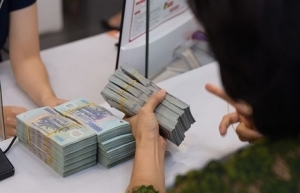Careful consideration required for sugary drink tax
The Ministry of Finance has requested comments on a proposal to amend the current excise tax law in which alcohol, tobacco, and soft drinks will be subject to an increased excise tax. What rate do you think is most suitable for firms at this time?
 |
| Adam Sitkoff, executive director of the American Chamber of Commerce in Hanoi |
AmCham recognises the need for Vietnam’s government to collect revenue and we support tax regimes that are fair and don’t discriminate against certain industries or groups of taxpayers. It seems that the proposal aims to reduce obesity and diabetes by reducing the consumption of sugary drinks.
However, once people look at data collected around the world, it is clear that taxing these drinks has proved ineffective in reducing obesity and diabetes, while causing negative impacts on the industry and the economy as a whole.
The US business community believes that greater transparency and predictability in Vietnam’s tax system would strengthen Vietnam’s investment climate, particularly avoidance of retroactive rulings and assessments. We appreciate the government’s actions that extended, postponed, and exempted taxes to support businesses and citizens during the pandemic.
While we recognise that new taxes and fees may be needed in the future, their impact should be considered carefully to ensure they support business recovery and do not undermine economic growth. For example, the government should study the potential impact of the proposed tax increase on businesses and consumers to avoid unintentional discrimination between sugar-sweetened beverages and other beverages or food containing sugar.
How does this proposal affect the market and businesses?
The proposed tax could halt growth and investment in this business sector. The introduction of special taxes on these product categories would require manufacturers to raise prices accordingly, which hurts the spending power of Vietnamese consumers.
It should also be noted that this business sector already contributes a significant, and growing, amount of tax revenue to the government.
A study conducted by the Central Institute of Economic Management in 2018 showed that if sugary drinks were taxed at 10 per cent, the revenue of the sugary drinks industry would decrease by almost VND4 billion ($168,600) while the tax would only increase the state budget by VND1.5 billion ($63,250). At the same time, the tax increase would also negatively impact other industries.
This proposal is inconsistent with government policies and guidelines on production and business recovery, especially tax reform policy towards 2025. However, of course, we welcome the opportunity to participate in an open dialogue with the government about tax policy and the impact on business sectors and consumers.
The number of countries collecting excise tax on sugary drinks increased from 15 in 2012 to 50 in 2021, including six in ASEAN. So, does it make sense to increase the tax on soft drinks in Vietnam?
While it is easy for people to blame big beverage companies for their problems, people should understand that sugar-sweetened beverages are not the main cause of obesity and diabetes. According to international studies, the fundamental cause of obesity is an energy imbalance between calories consumed and calories expended.
Studies indicate there has been an increased intake of energy-dense foods that are high in fat, salt, and protein but low in fibre; and an increase in physical inactivity due to the increasingly sedentary nature of many forms of work, changing modes of transportation, and increasing urbanisation.
Other studies also pointed out the link between obesity and lack of sleep, age, educational background and drug use. In fact, sugary drinks are not significant contributors to energy and calories for the body. A 2018 study by Vietnam’s National Institute of Nutrition showed that people with higher obesity prevalence did not consume more sugary drinks than other people.
Moreover, the correlation between increasing tax on sugar-sweetened beverages and a reduction in obesity or diabetes has not been proven in any country. In countries such as Norway, Mexico, India, Belgium, and more, obesity prevalence tends to increase after applying an extra tax on sugary drinks. Other countries like Denmark recognise that a special consumption tax on sweetened drinks was not effective in protecting consumers’ health and withdrew the tax after several years.
Many other nations instead focus on education and promotion of nutrition, fitness, and healthy lifestyles.
I strongly support efforts to improve the health and wellbeing of people. However, being healthy is a combination of many things, including lifestyle. Sugar has been around for more than 2,000 years and consumers want to be able to choose products they enjoy.
Many health experts say that these types of proposed taxes might not have any effect at all on obesity rates. That’s because people who are denied sugar in one form are likely to simply switch to another source such as yogurt, chocolate, or many other types of food.
If health is really the government’s concern, then the proposed tax should be applied to all foods and beverages that contain high levels of fat, sugar, and sodium, which are widely recognised as the main contributors to an imbalanced diet.
Would the tax be applied to classic Vietnamese dishes? Discriminatory regulations that focus on a single category of products have often been shown to be counter-productive in, for example, prompting substitution where the consumers will shift their consumption from sugar-sweetened beverages to other non-taxed, but equally or more calorically dense, products.
 | Tax watchdog aims to better manage real estate tax transactions Tax authorities are aiming to improve tax management of property transactions to prevent tax avoidance and increase State budget collection. |
 | Tax for development: Does Vietnam need tax reform? To remain on its successful path of inclusive development, Vietnam will need large public investments for years to come. |
 | Vietnam Tax Summit 2022 covers up-to-date tax legislation Vietnam Tax Summit 2022, the largest annual tax summit in the country that took place last week, featured thought-provoking guest speakers, industry experts, and tax specialists. |
What the stars mean:
★ Poor ★ ★ Promising ★★★ Good ★★★★ Very good ★★★★★ Exceptional
 Tag:
Tag:
Related Contents
Latest News
More News
- State corporations poised to drive 2026 growth (February 03, 2026 | 13:58)
- Why high-tech talent will define Vietnam’s growth (February 02, 2026 | 10:47)
- FMCG resilience amid varying storms (February 02, 2026 | 10:00)
- Customs reforms strengthen business confidence, support trade growth (February 01, 2026 | 08:20)
- Vietnam and US to launch sixth trade negotiation round (January 30, 2026 | 15:19)
- Digital publishing emerges as key growth driver in Vietnam (January 30, 2026 | 10:59)
- EVN signs key contract for Tri An hydropower expansion (January 30, 2026 | 10:57)
- Vietnam to lead trade growth in ASEAN (January 29, 2026 | 15:08)
- Carlsberg Vietnam delivers Lunar New Year support in central region (January 28, 2026 | 17:19)
- TikTok penalised $35,000 in Vietnam for consumer protection violations (January 28, 2026 | 17:15)






















 Mobile Version
Mobile Version